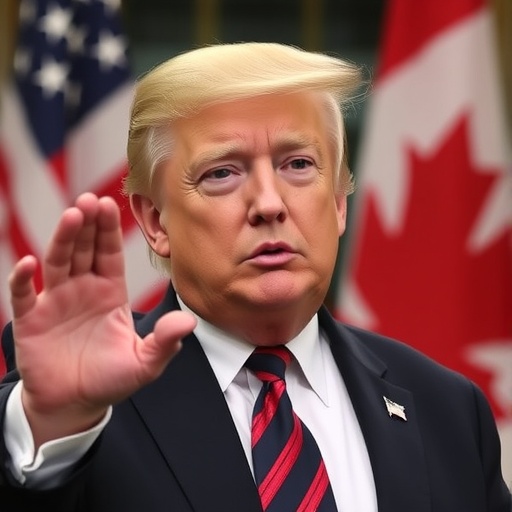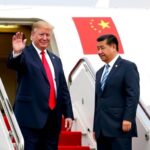Trump Halts U.S.-Canada Trade Talks: Tariffs Set to Surge Car and Appliance Prices Nationwide
In a move that has sent shockwaves through North American markets, President Donald Trump has abruptly ended ongoing trade talks with Canada, igniting fears of escalating tariffs that could drive up prices for everyday essentials like cars, auto parts, and home appliances. Trade experts are sounding the alarm, warning that this decision disrupts deeply intertwined supply chains, potentially adding hundreds of dollars to the cost of a new vehicle or refrigerator for American consumers.
The announcement came late Friday from the White House, where Trump cited unresolved disputes over dairy markets and border security as key sticking points. "Canada has been taking advantage of us for too long," Trump stated in a briefing, emphasizing his administration’s commitment to renegotiating terms under the United States-Mexico-Canada Agreement (USMCA). However, the sudden halt leaves businesses in limbo, with supply chain disruptions already rippling through industries reliant on cross-border commerce.
According to the U.S. Chamber of Commerce, bilateral trade between the U.S. and Canada exceeded $600 billion in 2023, with automotive and manufacturing sectors accounting for nearly 40% of that volume. Any imposition of tariffs—potentially as high as 25% on Canadian imports—could inflate costs across the board, experts say. This isn’t just theory; similar tariff hikes during Trump’s first term led to a 10-15% price increase on imported steel and aluminum, which cascaded into higher vehicle prices by an average of $1,000 per car, per a 2019 study by the Peterson Institute for International Economics.
Automotive Sector Braces for Tariff-Induced Price Hikes
The automotive industry, a cornerstone of U.S.-Canada economic ties, stands to suffer the most immediate blow from the stalled trade talks. Cars and trucks assembled in North America often crisscross the border multiple times during production—engines from Ontario might end up in Michigan assembly plants, only to return north for final wiring. With Trump signaling a return to pre-USMCA tariff levels, manufacturers like Ford, General Motors, and Stellantis are scrambling to assess the fallout.
"This uncertainty is a nightmare for our supply chains," said Mary Barra, CEO of General Motors, in a statement released Saturday. GM, which sources over 30% of its auto parts from Canada, warned that tariffs could force price adjustments on models like the Chevrolet Silverado and GMC Sierra, popular pickups built in joint U.S.-Canadian facilities. Analysts at Bloomberg estimate that a 10% tariff on Canadian auto parts could raise the sticker price of an average American-made SUV by $500 to $800, depending on the model’s complexity.
Statistics underscore the vulnerability: In 2023, Canada exported $50 billion worth of vehicles and parts to the U.S., supporting over 500,000 jobs on both sides of the border. The Alliance for Automotive Innovation, a trade group, highlighted that 80% of Canadian auto exports are integrated into U.S. manufacturing. Disruptions here don’t just mean higher prices; they could lead to production delays, as seen in 2018 when steel tariffs caused factory shutdowns lasting weeks.
Consumers might feel the pinch first at dealerships. For instance, the Ford F-150, America’s best-selling truck, relies on Canadian aluminum for its body panels. A reinstated 10% tariff could add $300 to the base price, according to Ford’s supply chain disclosures. Electric vehicles aren’t immune either—battery components from Canadian mines are critical for Tesla’s Model Y, produced in Texas but with northern inputs. As trade talks grind to a halt under Trump’s directive, industry leaders are urging swift resumption to avert a broader economic slowdown.
Household Appliances Face Supply Chain Chaos and Cost Surges
Beyond the roads, American kitchens and laundry rooms could soon see sticker shock as tariffs from the derailed U.S.-Canada trade talks threaten the appliance market. Major brands like Whirlpool, GE Appliances, and Electrolux depend heavily on Canadian steel, plastics, and electronics for washers, dryers, and refrigerators. With negotiations now paused, experts predict a 5-10% uptick in retail prices within months.
The Appliance Standards Awareness Project reports that Canada supplies 25% of the raw materials for U.S. appliance manufacturing, including specialized alloys used in energy-efficient compressors. "Tariffs will act like a tax on innovation," warned project director Andrew deLaski. "We could see fridge prices jump by $100 or more, hitting low-income families hardest." This echoes the 2018 tariff episode, when washing machine prices rose 12% nationwide, adding $1.5 billion to consumer costs annually, per Federal Reserve data.
Take Whirlpool, headquartered in Michigan but with key suppliers in Quebec. The company assembles over 70% of its U.S.-sold appliances domestically but imports critical components from Canada. A White House fact sheet from the announcement noted Trump’s frustration with Canada’s "unfair subsidies" in the sector, potentially justifying retaliatory tariffs. If implemented, these could inflate the cost of a standard top-load washer from $600 to $660, based on supply chain modeling by Deloitte.
Small businesses are equally exposed. Appliance retailers like Best Buy and Home Depot, which source inventory through cross-border logistics, may pass on costs or absorb margins, squeezing profits. The National Retail Federation estimates that trade uncertainty alone has already increased logistics costs by 15% this quarter. As prices climb, consumer spending on big-ticket items could dip, further pressuring an economy already grappling with inflation above 3%.
- Key Affected Products: Refrigerators (Canadian compressors), dishwashers (steel components), dryers (plastic housings).
- Projected Price Increases: 7-12% for mid-range models, per Consumer Reports simulations.
- Job Risks: Up to 100,000 positions in U.S. manufacturing at stake if supply chains fracture.
Trade Experts Sound Alarm on Broader Economic Ripples
Economists and trade analysts are painting a dire picture of the halted U.S.-Canada trade talks, with Trump’s decision potentially exacerbating inflation and straining bilateral relations. The Council on Foreign Relations described the move as "a step backward from USMCA stability," noting that unresolved issues like digital trade and environmental standards were progressing before the abrupt stop.
Dr. Elena Martinez, a senior economist at the Brookings Institution, told reporters, "Tariffs aren’t just about borders; they distort prices across the entire economy. We could see a 0.5% GDP hit in the short term, with consumers bearing 80% of the burden." Her analysis aligns with a recent IMF report projecting that renewed North American tariffs could add 0.2-0.4 percentage points to U.S. inflation by mid-2025. This is particularly concerning as the Federal Reserve navigates interest rate cuts amid cooling but persistent price pressures.
Political ramifications are mounting too. Canadian Prime Minister Justin Trudeau responded sharply, calling the halt "regrettable and shortsighted," and hinting at retaliatory measures on U.S. exports like energy and agriculture. In Washington, bipartisan criticism emerged: Senate Minority Leader Chuck Schumer decried it as "economic self-sabotage," while Republican Senator Mitt Romney urged Trump to "reengage before prices spiral." The U.S. Trade Representative’s office downplayed the severity, insisting talks could resume "imminently," but no timeline was provided.
Historical context adds weight: Trump’s 2018 tariffs on Canadian goods led to a tit-for-tat escalation, costing U.S. exporters $2.4 billion in lost sales, according to the U.S. Department of Agriculture. Today’s pause risks repeating that cycle, with modern complications like global chip shortages amplifying disruptions. Investment firms like Goldman Sachs have revised downward their forecasts for manufacturing PMI, predicting a contraction if tariffs materialize.
U.S. Consumers and Businesses Gear Up for Prolonged Uncertainty
As the dust settles on Trump’s trade talks suspension with Canada, businesses are activating contingency plans to mitigate rising prices and tariffs’ fallout. Major automakers are diversifying suppliers, eyeing Mexico and Asia, though such shifts could take years and incur upfront costs of billions. Appliance giants like Samsung are stockpiling imports, but logistics experts warn of port backlogs if tensions escalate.
For consumers, the advice is clear: Shop strategically now. "If you’re in the market for a car or major appliance, act before tariffs lock in," advised Consumer Federation of America president Stephen Brobeck. Online forums and retail sites are buzzing with preemptive buying, reminiscent of the toilet paper rush during early pandemic supply scares. Yet, experts caution against panic—prices may stabilize if talks restart.
Looking ahead, the path forward hinges on diplomatic breakthroughs. Informal channels between U.S. and Canadian officials suggest side negotiations on dairy quotas could reopen doors, but Trump’s base demands tough stances. The World Trade Organization may intervene if disputes formalize, potentially delaying tariffs for months. In the interim, Americans face a precarious balance: higher prices on wheels and home fronts, underscoring the high stakes of North American trade interdependence.
Stakeholders from Detroit to Ottawa are watching closely, hoping for de-escalation. If unresolved, this could redefine U.S.-Canada economic ties for years, with everyday prices as the ultimate barometer of success or failure.








